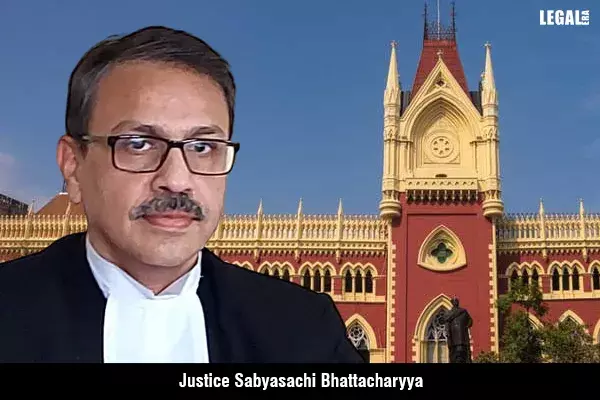Calcutta High Court: Unilateral Appointment Under Section 12(5) Renders Arbitrator Ineligible Even Without Allegation Of Bias
Justice Sabyasachi Bhattacharyya of the Calcutta High Court has ruled that even the unilateral appointment of an arbitrator;

Calcutta High Court: Unilateral Appointment Under Section 12(5) Renders Arbitrator Ineligible Even Without Allegation Of Bias
Justice Sabyasachi Bhattacharyya of the Calcutta High Court has ruled that even the unilateral appointment of an arbitrator without any additional allegation of bias under Section 12(5) of the Arbitration and Conciliation Act, 1996, renders the arbitrator ineligible.
The bench emphasized that, apart from the grounds explicitly outlined in Section 12(5) in conjunction with the Seventh Schedule, the act of unilaterally appointing an arbitrator by one party alone is now considered a disqualifying factor leading to ineligibility.
Additionally, the High Court clarified that while the unilateral appointment of an arbitrator under Section 12(5) does not invalidate arbitral proceedings and subsequent awards ab initio, it does render the arbitrator ineligible for the role.
Section 12(5) stipulates that individuals falling within certain categories as specified in the Seventh Schedule, due to their relationship with the parties or the subject matter in dispute, are ineligible to serve as arbitrators.
Kotak Mahindra Bank Limited (award-holder) approached the High Court, filing an application under Section 36 of the Arbitration and Conciliation Act, 1996, seeking enforcement of an ex parte award. Shalibhadra Cottrade Pvt. Ltd. (award-debtor) contested this application, arguing that the arbitrator's appointment was unilateral. The award-debtor asserted that the arbitrator was de jure ineligible under Section 12(5), read with the Seventh Schedule, rendering the award void ab initio and thus unenforceable.
In response, the award-holder contended that Section 36 of the Arbitration Act establishes a legal fiction for award enforcement akin to the Code of Civil Procedure, thereby excluding the applicability of Section 47 CPC. It maintained that challenges to an award's validity must be raised under Section 34 and not during enforcement proceedings.
The High Court referred to the Supreme Court's decision in Bharat Broadband Network Ltd. v. United Telecoms Ltd., where it was held that the proviso to Section 12(5) of the Arbitration Act applies only if the parties expressly agree in writing, after disputes have arisen, to waive the applicability of Section 12(5).
Further elaborating on this, the Supreme Court noted in Bharat Broadband Network Ltd. that in cases falling under Section 12(5), Section 14(1)(a) of the Arbitration Act becomes pertinent as the arbitrator becomes de jure unable to perform their functions under Section 12(5) and thereby ineligible for appointment. Consequently, the arbitrator's mandate automatically terminates. The Supreme Court emphasized that if there is a dispute over whether the arbitrator has become de jure unable to perform their functions, a party must apply to the court to decide on the termination of the mandate, unless otherwise agreed by the parties.
The High Court observed that the party objecting to the jurisdiction or capacity of the arbitrator did not raise these objections until after the conclusion of the arbitral proceedings. Citing its decision in Cholamandalam Investment and Finance Company Ltd. v. Amrapali Enterprises and Another, the High Court noted that awards made by a unilaterally appointed arbitrator are considered null and void in the eyes of the law.
In Perkins Eastman Architects DPC and Another v. HSCC (India) Limited, the Supreme Court discussed two scenarios: one where a managing director is appointed as an arbitrator with the power to appoint another arbitrator, and another where the managing director can appoint someone else as an arbitrator but does not act as one themselves. The Supreme Court included both scenarios under the purview of ineligibility, in addition to the criteria specified in Section 12(5) read with the Seventh Schedule, adding unilateral appointment as a ground for ineligibility.
Similarly, in TRF Limited v. Energo Engineering Projects Limited, the Supreme Court ruled that once a named arbitrator becomes ineligible by operation of law (in that case, the managing director of the respondent), they cannot nominate another arbitrator. The Supreme Court emphasized that, with the loss of identity as the sole arbitrator, the power to nominate another arbitrator is also lost.
The High Court further clarified that besides the grounds explicitly mentioned in Section 12(5) read with the Seventh Schedule, including bias, the unilateral appointment of an arbitrator by one party alone is now also considered a disqualification due to ineligibility. Therefore, the High Court ruled that even a unilateral appointment of an arbitrator, without additional allegations of bias, renders the arbitrator ineligible.
Regarding the decisions of the Supreme Court in TRF Limited and Perkins Eastman Architects DPC concerning challenges under Section 11(6) of the Arbitration Act, the High Court noted that these cases allow courts to annul appointments due to procedural failures or clear violations of arbitration clause fundamentals. However, the High Court pointed out that these cases did not explicitly address whether such ineligibility fundamentally undermines the entire arbitral proceeding and award if not raised at any stage during the process.
Under Section 12(5) of the Arbitration Act, the High Court highlighted that parties have the option to waive post-dispute ineligibility through a written agreement. It held that this provision implies that such disqualification is not an absolute barrier. The court emphasized that the inclusion of a waiver provision suggests that ineligibility does not inherently invalidate the arbitrator's assumption of jurisdiction at the outset, nor does it nullify the subsequent award if appropriately waived.
In conclusion, the High Court held that despite the disqualification arising from unilateral appointment falling under Section 12(5), it does not constitute an inherent lack of jurisdiction that would render the entire arbitral proceeding and consequential award null and void ab initio. Therefore, the High Court dismissed the petition.

